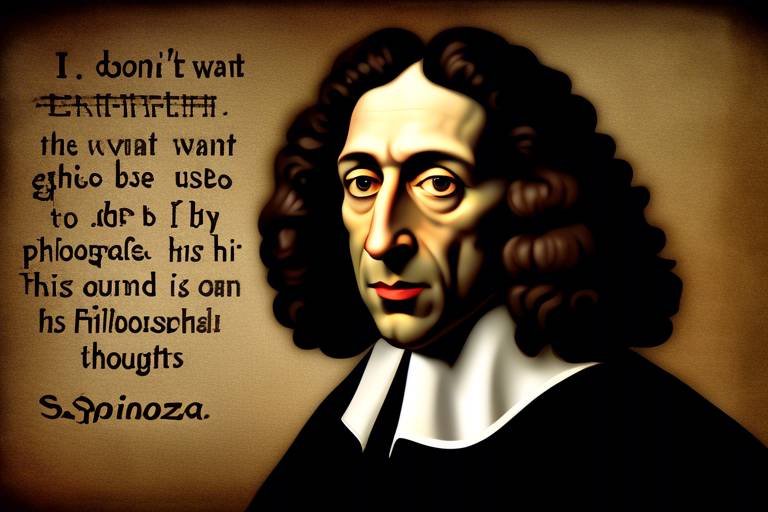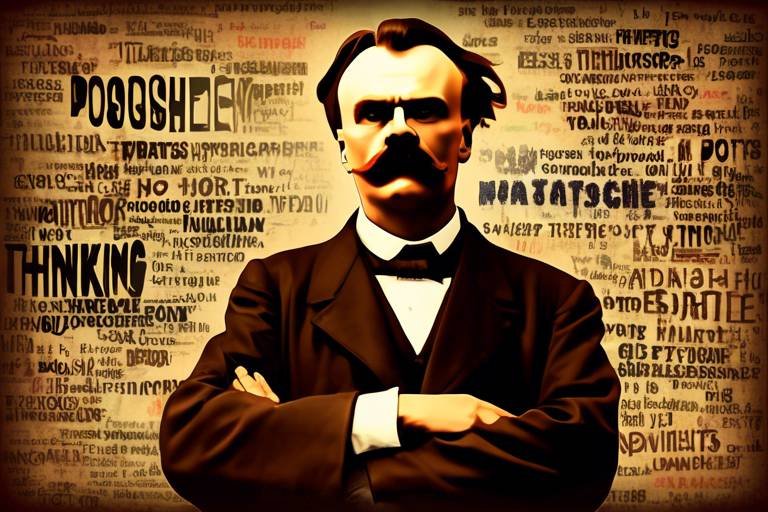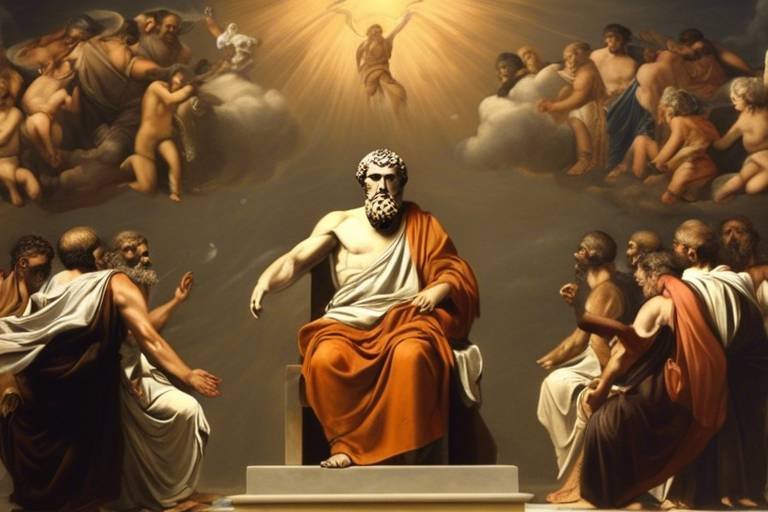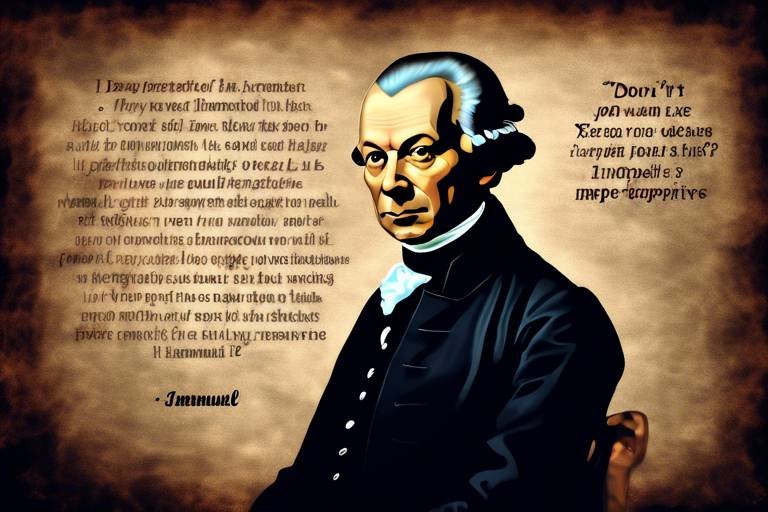Spinoza’s Ethics – A Guide to His Philosophical Thoughts
Welcome to the intriguing world of Baruch Spinoza, a philosopher whose ideas continue to resonate through the corridors of time. Spinoza's ethical philosophy is not just a collection of abstract thoughts; it’s a vibrant tapestry woven from the threads of substance, God, human emotions, and the pursuit of happiness. Imagine sitting down with a cup of coffee, diving deep into a conversation about the nature of existence, and finding that every sip brings you closer to understanding the universe and your place within it. This article will guide you through Spinoza’s core concepts, revealing how his rational approach can lead to a fulfilling and ethical life.
At the heart of Spinoza's ethics lies his fascinating conception of substance. He boldly posits that there is only one substance, which he identifies as God or Nature. Now, you might wonder, what does this mean for our understanding of the universe? For Spinoza, everything that exists is a manifestation of this single substance, and this monistic view has profound implications. It suggests that all things are interconnected, like a grand web of existence where every thread is essential. This perspective challenges the dualistic notions that separate the divine from the mundane, urging us to see the sacred in the everyday.
In Spinoza's framework, God is not a distant, personal deity who watches over us from above. Instead, he argues that God is synonymous with the universe itself. This radical shift in perspective shapes his ethical theories and alters our understanding of divinity. Imagine walking through a forest and realizing that the trees, the soil, and the sky are all expressions of the divine. This view impacts how we relate to the world and each other, fostering a sense of unity and belonging.
Spinoza's assertion that God is immanent rather than transcendent is a game-changer. It means that God exists within everything, including us. This idea challenges traditional notions of divinity and has profound ethical implications. If God is present in all things, then our actions become part of a larger divine order. This perspective encourages us to act with greater awareness and responsibility, knowing that our choices resonate throughout the universe.
By viewing God as immanent, Spinoza suggests that human actions are not isolated events but integral components of the divine fabric. This belief invites us to reconsider our understanding of free will and moral responsibility. Are we merely puppets in a cosmic play, or do our choices hold genuine significance? Spinoza nudges us toward the latter, implying that our decisions impact the greater whole, urging us to act ethically and thoughtfully.
Spinoza equates God with the laws of nature, leading to a deterministic view of the universe. This perspective might sound a bit daunting, but it actually offers clarity in ethical decision-making. If everything unfolds according to natural laws, then understanding these laws can guide us in our actions. It’s like being given a map to navigate a complex landscape—suddenly, the path to ethical living becomes clearer!
Spinoza presents a unique view of emotions, considering them as integral to human nature. Rather than viewing emotions as obstacles to rational thought, he suggests that understanding them can lead to better ethical choices and personal well-being. Imagine emotions as the colors on an artist’s palette; when blended thoughtfully, they create a masterpiece of human experience. By acknowledging our emotions, we can navigate life’s challenges with greater insight and compassion.
For Spinoza, true happiness arises from understanding oneself and the universe. He emphasizes that rational thought and emotional understanding are key components of a fulfilling life. Think of happiness as a garden; it requires both the sunlight of reason and the nourishment of emotional insight to flourish. By cultivating both, we can create a life that is rich, meaningful, and deeply connected to the world around us.
Spinoza places significant importance on reason in achieving ethical living. Rationality acts as a compass, guiding us through the tumultuous seas of our emotions. It’s like having a trusty map that helps us avoid the rocky shores of impulsive decisions. By harnessing the power of reason, individuals can navigate their emotions and make ethical choices that align with their true selves.
Spinoza believes that ethical behavior fosters social harmony. When individuals act ethically, they contribute to the collective well-being of society. It’s akin to a symphony; when each musician plays in harmony, the result is a beautiful melody that resonates with all. This perspective encourages us to see our ethical choices not just as personal decisions but as contributions to the greater good, promoting societal progress and unity.
- What is the core idea of Spinoza's ethics? Spinoza’s ethics revolve around understanding the interconnectedness of substance, God, and human emotions, emphasizing rational thought as a path to happiness.
- How does Spinoza view God? Spinoza sees God as immanent, equating God with nature and the laws governing the universe, rather than as a distant, personal deity.
- What role do emotions play in Spinoza's philosophy? Emotions are seen as integral to human nature, and understanding them can lead to better ethical choices and personal well-being.
- How does Spinoza define happiness? True happiness, according to Spinoza, arises from rational understanding and emotional insight, contributing to a fulfilling life.

Understanding Substance in Spinoza's Philosophy
Spinoza's conception of substance is a cornerstone of his ethical philosophy, setting the stage for how we understand not only the universe but also our place within it. At the heart of Spinoza's thought lies the radical idea that there is only one substance, which he identifies as God or Nature. This monistic view radically shifts the way we perceive existence, suggesting that everything we see around us is a manifestation of this singular substance. Imagine a vast ocean; each wave represents a different aspect of the same body of water, just as every object and being in the universe is a mode of the one substance.
In Spinoza's framework, the implications of this idea are profound. If everything is an expression of the same substance, then the distinctions we often make between the sacred and the mundane, the divine and the earthly, begin to blur. This leads us to consider the interconnectedness of all things. Spinoza's philosophy encourages us to see ourselves not as isolated individuals but as part of a larger, unified whole, where every action and thought resonates with the cosmos. It's a perspective that invites us to reflect on our responsibilities towards one another and the world around us.
To further unpack this notion, we can break down the concept of substance into several key implications:
- Unity of Existence: Everything that exists is part of the same substance, leading to a holistic view of reality.
- Interconnectedness: All beings and objects are interconnected, influencing one another in ways that may not be immediately apparent.
- Determinism: Since everything is a mode of substance, events unfold according to the laws of nature, which are expressions of this substance.
Spinoza's view also challenges the traditional dualistic perspective that separates mind and body, or spirit and matter. Instead, he posits that mind and body are two attributes of the same substance, each reflecting the same reality in different ways. This idea not only enriches our understanding of human nature but also informs our ethical considerations. If our thoughts and feelings are part of the same substance as the physical world, then they hold intrinsic value and significance.
Ultimately, grasping Spinoza's understanding of substance invites us to embrace a more integrative approach to life and ethics. It encourages us to recognize that our actions have far-reaching consequences, not just for ourselves but for the entire web of existence. By acknowledging our place within this unified substance, we can begin to cultivate a sense of responsibility and care for others, leading to a more harmonious existence.

The Nature of God in Spinoza's Ethics
When we dive into Spinoza's philosophy, we quickly realize that his conception of God is anything but traditional. Unlike the typical image of a personal deity who governs the universe from a distance, Spinoza presents a radically different perspective. In his view, God is synonymous with the universe itself, an idea that challenges our conventional understanding of divinity. This notion of God as an all-encompassing substance leads us to consider Him not as a being separate from the world but as the very essence of everything that exists.
Spinoza's idea of God can be broken down into several key points:
- God is Immanent: Rather than being a transcendent entity, God exists within all things. This means that everything around us, including ourselves, is a manifestation of the divine.
- Unity of Substance: For Spinoza, there is only one substance, which is God or Nature. This monistic view implies that all distinctions we make—between people, objects, and ideas—are ultimately superficial.
- Determinism: If God is the substance of everything, then everything that happens is a result of God's nature. This leads to a deterministic view of the universe, where every event is a necessary outcome of preceding causes.
This perspective has profound implications for how we understand our own lives and actions. If God is immanent, then our actions are not isolated from the divine order; they are part of it. This realization can be both liberating and daunting. It implies that we are not merely subject to the whims of a distant deity but are instead active participants in a grand, interconnected system. Our choices, therefore, carry weight, as they contribute to the unfolding of the universe.
Furthermore, by equating God with the laws of nature, Spinoza challenges the idea of free will. If everything is determined by the nature of God, how do we reconcile this with the notion of moral responsibility? Spinoza argues that understanding this divine order allows us to navigate our lives with greater clarity and purpose. Instead of feeling at the mercy of fate, we can learn to align our actions with the natural order, leading to a more harmonious existence.
Ultimately, Spinoza’s view of God reshapes our ethical framework. By recognizing that we are part of a larger divine tapestry, we can cultivate a sense of empathy and responsibility toward others. Our actions are not just for our own benefit but for the greater good of the universe. This interconnectedness fosters a sense of community and social harmony, as we begin to see ourselves in each other.
In summary, Spinoza's conception of God as immanent, unified, and deterministic offers a refreshing lens through which to view our existence. It invites us to reconsider our place in the universe and our responsibilities to one another, ultimately guiding us toward a more ethical and fulfilling life.

God as Immanent
Spinoza’s revolutionary idea that God is immanent fundamentally reshapes our understanding of divinity. Unlike traditional views that depict God as a distant, transcendent being, Spinoza argues that God exists within everything and is synonymous with nature itself. Imagine the universe as a vast tapestry, where every thread is a part of the divine fabric. This perspective not only challenges conventional notions of God but also invites us to reconsider our place within the cosmos.
By asserting that God is immanent, Spinoza implies that all things are interconnected through this single divine substance. This means that everything we see, touch, and experience is a manifestation of God. In this light, the universe is not just a backdrop for human existence; it is alive with the essence of the divine. This view encourages us to look at the world around us with reverence and appreciation, recognizing that every element of nature, from the smallest atom to the grandest galaxy, is infused with divinity.
Furthermore, this understanding of God has profound implications for how we perceive our own actions and moral responsibilities. If God is present in everything, then our choices and behaviors are not merely personal decisions; they are part of a larger divine order. This leads to the idea that our actions are not just isolated events but are woven into the fabric of existence itself. In this sense, we become co-creators of our reality, influencing the divine substance through our choices.
Spinoza's view of immanence also challenges the notion of a personal God who intervenes in human affairs. Instead, he presents a more holistic understanding of divinity that is constant and unchanging, governed by the laws of nature. This deterministic perspective implies that everything unfolds according to a rational and logical order, which can be understood through reason. Thus, human beings are encouraged to cultivate their intellect and emotions to align with this divine order, leading to a more harmonious existence.
In conclusion, Spinoza’s concept of God as immanent invites us to explore the depths of our relationship with the universe. By recognizing the divine presence within all things, we can foster a deeper connection to nature and to one another. This understanding not only enriches our spiritual lives but also challenges us to act ethically, knowing that our actions resonate throughout the divine tapestry of existence.
- What does Spinoza mean by God being immanent?
Spinoza's concept of God being immanent means that God exists within everything and is not a separate, transcendent being. This view emphasizes the interconnectedness of all things as manifestations of the divine.
- How does Spinoza's view of God affect our understanding of free will?
By viewing God as immanent, Spinoza suggests that human actions are part of a larger divine order, which influences our understanding of free will and moral responsibility.
- Why is it important to understand emotions in Spinoza's philosophy?
Spinoza believes that understanding our emotions can lead to better ethical choices and personal well-being, helping us align our actions with the rational order of the universe.

Implications for Human Agency
When we dive into the depths of Spinoza's philosophy, we encounter a fascinating perspective on human agency that challenges conventional beliefs about free will and moral responsibility. Spinoza’s view that God is immanent suggests that everything we do is part of a larger divine order. But what does this mean for us as individuals? Are we simply puppets on a string, or do we hold the reins of our own destiny?
To understand Spinoza’s implications for human agency, we must first recognize that he sees our actions as expressions of the divine substance. This monistic view implies that everything, including human choices, is interconnected within the fabric of nature. Therefore, when we act, we are not merely exercising free will in isolation; instead, we are participating in a grand, deterministic play where our choices are influenced by our understanding of ourselves and the world around us.
Spinoza argues that acknowledging this interconnectedness can lead to a more profound sense of responsibility. If our actions are part of the divine order, then understanding the reasons behind our emotions and decisions becomes crucial. Here’s where it gets interesting: by embracing reason and rational thought, we can align our actions with the natural laws that govern existence. This alignment fosters a sense of agency that is not about arbitrary choice but about informed decision-making.
Consider this analogy: think of a river flowing through a landscape. The river represents the divine order, and each rock, bend, and tributary symbolizes individual human actions. While the water flows in a predetermined direction, the rocks and bends influence its course. In the same way, our understanding and emotions shape our decisions within the framework of Spinoza's ethics.
Moreover, Spinoza's perspective encourages us to view challenges and adversities not as hindrances but as opportunities for growth. By understanding that our emotions are natural responses to our environment, we can better navigate our actions. This understanding empowers us to take responsibility for our choices, recognizing that we are not victims of circumstance but active participants in our lives.
In essence, Spinoza’s approach to human agency invites us to reconsider the balance between determinism and free will. It suggests that while our actions are part of a larger cosmic order, we still possess the ability to influence our path through rational understanding and emotional awareness. This creates a dynamic interplay where our agency is both shaped by the universe and, in turn, shapes the universe itself.
In conclusion, the implications of Spinoza's philosophy on human agency are profound. By embracing the interconnectedness of all things and recognizing the role of reason in our lives, we can cultivate a deeper sense of responsibility and purpose. This understanding not only enriches our personal lives but also contributes to a more harmonious society, where ethical behavior is rooted in a shared understanding of our place within the divine order.
- What is Spinoza’s view on free will?
Spinoza believes that while we may feel we have free will, our choices are influenced by our understanding and emotions, which are part of the larger divine substance. - How does Spinoza define God?
For Spinoza, God is synonymous with nature and the universe, rather than a personal deity, emphasizing that everything is interconnected. - What role do emotions play in Spinoza’s ethics?
Emotions are essential in Spinoza's philosophy; understanding them can lead to better ethical choices and a fulfilling life. - Can understanding Spinoza’s ethics improve our lives?
Yes! By applying rational thought and understanding our emotions, we can make more informed decisions that contribute to our happiness and societal harmony.

God and the Laws of Nature
In Spinoza's philosophy, the relationship between God and the laws of nature is a cornerstone of his ethical framework. He posits that God is not a distant, controlling entity, but rather the very essence of the universe itself. This radical view leads to a deterministic perspective, where everything that happens is a manifestation of God's nature. Imagine a grand clockwork mechanism where every cog and wheel operates in perfect harmony; this is how Spinoza envisions the universe, with God as the driving force behind every event.
According to Spinoza, the laws of nature are not separate from God; they are expressions of God's essence. This means that understanding the laws of nature is akin to understanding God. For instance, when we study physics or biology, we are, in essence, studying the divine. This perspective encourages a deep respect for the natural world, as it is viewed as a reflection of the divine order. Spinoza's ethics thus advocate for a life aligned with these natural laws, suggesting that by doing so, individuals can achieve true fulfillment and happiness.
Furthermore, Spinoza's deterministic view implies that human actions are also governed by these laws. While this might seem to undermine the concept of free will, Spinoza offers a different angle. He argues that true freedom comes from understanding the nature of our desires and emotions within the framework of these laws. By recognizing that our choices are influenced by a multitude of factors—both internal and external—we can begin to act more rationally and ethically.
To illustrate this relationship, consider the following table that outlines the key components of Spinoza's view on God and the laws of nature:
| Aspect | Description |
|---|---|
| God | Identical to nature; immanent and not transcendent. |
| Determinism | All events are part of a divine order, governed by natural laws. |
| Human Actions | Influenced by the same laws; understanding leads to ethical living. |
| Ethics | Aligning oneself with nature's laws results in happiness and fulfillment. |
In conclusion, Spinoza's view of God and the laws of nature invites us to reconsider our place in the universe. Rather than seeing ourselves as separate from the divine, we are encouraged to perceive our actions and emotions as integral parts of a larger, interconnected whole. This understanding not only enhances our ethical decision-making but also fosters a profound sense of belonging within the cosmos.
- What is Spinoza's view on free will?
Spinoza believes that while our actions are determined by the laws of nature, true freedom arises from understanding these laws and our place within them.
- How does Spinoza define God?
For Spinoza, God is synonymous with nature, existing within everything rather than being a separate, personal deity.
- What role do emotions play in Spinoza's ethics?
Emotions are seen as natural responses that, when understood rationally, can guide us toward ethical living.
- Can studying science be considered a spiritual practice according to Spinoza?
Yes, studying nature and its laws is a way to understand God, making scientific inquiry a spiritual endeavor.

Human Emotions and Ethics
When we think about ethics, we often imagine a strict code of conduct, a list of dos and don'ts that we should follow to be considered good people. However, Spinoza challenges this notion by placing human emotions at the center of ethical behavior. According to him, emotions are not just fleeting feelings we experience; they are integral to our nature and play a crucial role in how we make ethical decisions. Imagine emotions as the colors on an artist's palette—each hue contributes to the final masterpiece of our ethical lives.
Spinoza categorizes emotions into three main types: active emotions, which promote our well-being; passive emotions, which can lead to suffering; and complex emotions, which arise from our interactions with others. Understanding these categories is vital because it helps us navigate our emotional landscape. For instance, when we experience jealousy or anger, recognizing these as passive emotions allows us to reflect on their origins and impacts rather than simply reacting impulsively.
By embracing our emotions instead of suppressing them, we can achieve a more profound understanding of ourselves and our ethical responsibilities. Spinoza argues that true ethical living is about harmonizing our emotional states with rational thought. This harmony leads to better decision-making and a more fulfilling life. It's like tuning a musical instrument; when all the strings are in harmony, the music produced is beautiful and resonant.
Moreover, Spinoza believes that emotions can be transformed through knowledge and understanding. When we gain insight into our feelings and the feelings of others, we can shift from negative emotions to positive ones. This transformation is not just beneficial for the individual but also for society as a whole. When we act from a place of understanding rather than reactivity, we contribute to a more compassionate and ethical community.
To illustrate this point, consider the following table that summarizes how different emotions can influence ethical behavior:
| Type of Emotion | Impact on Ethics | Example |
|---|---|---|
| Active Emotions | Promote well-being and ethical actions | Empathy leading to charitable acts |
| Passive Emotions | Can lead to unethical behavior if unchecked | Jealousy causing betrayal |
| Complex Emotions | Require reflection for ethical understanding | Guilt prompting reparative actions |
Ultimately, Spinoza's view on emotions and ethics encourages us to engage with our feelings deeply and thoughtfully. Rather than viewing emotions as obstacles to ethical living, we should see them as opportunities for growth and understanding. This perspective not only enriches our personal lives but also enhances our collective ethical framework, fostering a society that values empathy and rationality.
- What is Spinoza's view on the role of emotions in ethics?
Spinoza believes that emotions are central to ethical decision-making and should be understood and embraced rather than suppressed. - How can understanding emotions lead to better ethical choices?
By recognizing and reflecting on our emotions, we can transform negative feelings into positive actions, leading to more ethical behavior. - What types of emotions does Spinoza categorize?
Spinoza categorizes emotions into active, passive, and complex emotions, each influencing ethical behavior differently.

The Pursuit of Happiness
For Spinoza, the journey towards true happiness is not merely a whimsical chase but a profound exploration of self and the universe. He believed that happiness is deeply intertwined with our understanding of both our own nature and the world around us. Unlike the fleeting pleasures that come from external sources, Spinoza posited that genuine happiness stems from the cultivation of rational thought and emotional understanding. This idea revolutionizes the way we perceive happiness, shifting the focus from external validation to internal comprehension.
To Spinoza, happiness is less about chasing after desires and more about achieving a state of contentment through knowledge and understanding. He argued that when we comprehend our emotions and the nature of reality, we can align ourselves with the fundamental order of the universe. This alignment brings about a sense of peace and fulfillment that cannot be easily shaken by external circumstances. It's akin to finding a calm center in the midst of a storm; the chaos may swirl around us, but our inner tranquility remains intact.
In his ethical framework, Spinoza emphasizes the role of reason as the guiding force in our lives. He believed that by employing rationality, individuals can navigate the complexities of their emotions and make decisions that lead to ethical living. This process of understanding is not just an intellectual exercise; it’s a transformative journey that shapes our character and influences our actions. When we learn to recognize our emotions as natural occurrences, we can better manage them, leading to a more harmonious existence.
Spinoza also highlights the importance of social connections in the pursuit of happiness. He asserts that ethical behavior fosters social harmony, which in turn contributes to individual well-being. When we act ethically, we not only uplift ourselves but also enhance the lives of those around us. This interconnectedness creates a ripple effect, where individual happiness contributes to collective joy. Imagine a community where everyone strives for ethical living; the result is a flourishing society where happiness is not just an individual pursuit but a shared experience.
Ultimately, Spinoza’s vision of happiness is a holistic one. It encompasses the mind, body, and spirit, urging us to seek understanding and connection in all aspects of life. By embracing this multifaceted approach, we can cultivate a deeper sense of happiness that transcends the superficial and taps into the essence of our being. As we engage with the world through the lens of reason and empathy, we unlock the potential for a fulfilling and joyous existence.
- What is Spinoza's definition of happiness?
Spinoza defines happiness as a state achieved through understanding oneself and the universe, emphasizing the role of rational thought and emotional awareness. - How does reason contribute to happiness according to Spinoza?
For Spinoza, reason helps individuals navigate their emotions and make ethical decisions, leading to a more fulfilling life. - What role do social connections play in Spinoza's philosophy of happiness?
Spinoza believes that ethical behavior fosters social harmony, which enhances individual well-being and contributes to collective happiness.

The Role of Reason
In the grand tapestry of Spinoza's ethical philosophy, reason emerges as the golden thread that weaves together our understanding of the self and the universe. Spinoza believed that the pursuit of happiness is not a whimsical endeavor but rather a rational quest grounded in understanding. Imagine trying to navigate a dense forest without a map; you would likely feel lost and overwhelmed. Similarly, without reason, individuals can feel adrift in a sea of emotions and impulses. Spinoza posits that by harnessing the power of reason, we can chart our course toward a more fulfilling life.
Reason, in Spinoza's view, is not merely a tool for logical deduction but a profound force that enables us to comprehend our emotions and the world around us. He suggests that emotions can often cloud our judgment, leading to choices that may not align with our true interests. By applying reason, we can dissect our feelings, understand their origins, and ultimately transform them into a source of strength rather than a hindrance. This transformative process allows individuals to rise above their immediate desires and make choices that contribute to their long-term well-being.
To illustrate this point, consider the following key aspects of how reason plays a vital role in Spinoza's ethical framework:
- Clarity of Thought: Reason provides clarity, enabling individuals to distinguish between fleeting emotions and lasting values.
- Self-Understanding: Through rational reflection, one can gain insights into personal motivations and desires, fostering a deeper self-awareness.
- Ethical Decision-Making: Reason equips individuals with the ability to weigh the consequences of their actions, promoting ethical choices that benefit both themselves and society.
Spinoza's emphasis on reason as a guiding principle serves as a reminder that while emotions are an integral part of the human experience, they should not dictate our actions. Instead, by cultivating a rational mindset, we can achieve a harmonious balance between our emotional landscape and our ethical obligations. This balance is crucial for fostering a sense of peace and fulfillment in our lives.
Moreover, Spinoza highlights that the collective well-being of society is also contingent upon the rationality of its individuals. When people act based on reason rather than mere impulse, they contribute to a more harmonious social fabric. This interconnectedness underscores the idea that personal ethics are not isolated but rather resonate through the community, promoting social progress and unity.
In conclusion, the role of reason in Spinoza's ethics is not just about making sound judgments; it is about embracing a way of life that values understanding and clarity. By prioritizing reason, individuals can navigate the complexities of their emotions and the world, ultimately leading to a more ethical and fulfilling existence.
- What is Spinoza's view on emotions? Spinoza sees emotions as natural aspects of human existence that can be understood and managed through reason.
- How does reason contribute to happiness according to Spinoza? Reason helps individuals understand their emotions and make ethical decisions that align with their true interests, leading to a fulfilling life.
- Can reason alone lead to ethical behavior? While reason is crucial, Spinoza emphasizes the importance of understanding emotions and their impact on our actions for true ethical living.

Ethics and Social Harmony
When we dive into Spinoza's philosophy, one of the most remarkable aspects is how he connects individual ethics with the broader concept of social harmony. Imagine a symphony orchestra: each musician plays their part, but it’s the harmony of their collective sound that creates beautiful music. Similarly, Spinoza argues that ethical behavior on an individual level contributes significantly to the well-being of society as a whole. When individuals act ethically, they not only enhance their own lives but also foster a sense of community and cooperation among others.
Spinoza believed that when we understand our emotions and act rationally, we are more likely to engage in behaviors that promote social cohesion. This is because ethical individuals are inclined to consider the interests of others, leading to a more compassionate society. For instance, when someone acts out of kindness or fairness, it encourages others to do the same, creating a ripple effect. It’s like tossing a stone into a pond—the ripples spread out, affecting everything around them.
Furthermore, Spinoza’s view that we are all part of the same substance, or God, suggests that harming another person is, in essence, harming oneself. This profound realization can lead to a deeper understanding of our interconnectedness. When we recognize that our actions have consequences not just for ourselves but for others, it cultivates a sense of responsibility and ethical obligation. To illustrate this point, consider the following table:
| Individual Actions | Impact on Society |
|---|---|
| Acts of Kindness | Encourages a culture of compassion and support. |
| Dishonesty | Undermines trust and leads to societal discord. |
| Cooperation | Fosters collaboration and progress. |
| Selfishness | Creates division and conflict. |
In essence, Spinoza’s ethical framework promotes the idea that our personal choices are deeply intertwined with the fabric of society. When individuals prioritize ethical living, they contribute to a more harmonious existence. This leads to a society where empathy, respect, and understanding flourish, creating a collective environment that benefits everyone.
To sum it up, Spinoza’s thoughts on ethics and social harmony remind us that we are not isolated beings; rather, we are part of a larger whole. Our ethical decisions can either uplift or undermine the community around us. By embracing ethical principles, we can help create a world that resonates with harmony and mutual respect.
- What is Spinoza's view on ethics?
Spinoza believes that ethics is grounded in understanding our emotions and rational thought, which leads to individual and social harmony. - How does individual behavior affect society?
According to Spinoza, ethical behavior promotes social cohesion and encourages others to act similarly, creating a positive ripple effect. - What is the relationship between God and ethics in Spinoza's philosophy?
Spinoza equates God with nature and believes that understanding this relationship is key to ethical living and personal fulfillment.
Frequently Asked Questions
- What is Spinoza's view on substance?
Spinoza believes that there is only one substance, which he identifies as God or Nature. This monistic view means that everything in the universe is interconnected and part of the same essence. Understanding this helps us grasp the foundation of his ethical philosophy.
- How does Spinoza define God?
In Spinoza's philosophy, God is not a personal deity but is synonymous with the universe itself. This perspective shifts the focus from a transcendent God to an immanent one, meaning God exists within everything around us, influencing how we understand divinity and our place in the universe.
- What are the implications of God being immanent?
By viewing God as immanent, Spinoza suggests that human actions are part of the divine order. This challenges traditional ideas of free will, suggesting that our choices are interconnected with the universe's deterministic nature, impacting our understanding of moral responsibility.
- How does Spinoza relate God to the laws of nature?
Spinoza equates God with the laws of nature, promoting a deterministic view of the universe. This means that ethical decision-making is influenced by natural laws, encouraging individuals to align their actions with the inherent order of the world.
- What is Spinoza's perspective on human emotions?
Spinoza views emotions as integral to human nature. He believes that by understanding our emotions, we can make better ethical choices and improve our personal well-being. This perspective invites us to embrace our feelings rather than suppress them.
- How does Spinoza define happiness?
For Spinoza, true happiness stems from understanding oneself and the universe. He argues that rational thought and emotional understanding are key components in achieving a fulfilling life, suggesting that happiness is a product of knowledge and self-awareness.
- What role does reason play in Spinoza's ethics?
Reason is central to Spinoza's ethical framework. He emphasizes that rationality enables individuals to navigate their emotions effectively and make ethical decisions, promoting a life that aligns with both personal and collective well-being.
- How does Spinoza's ethics contribute to social harmony?
Spinoza believes that ethical behavior is crucial for fostering social harmony. By encouraging individuals to act ethically, he posits that collective well-being and societal progress will naturally follow, creating a more harmonious community.



















